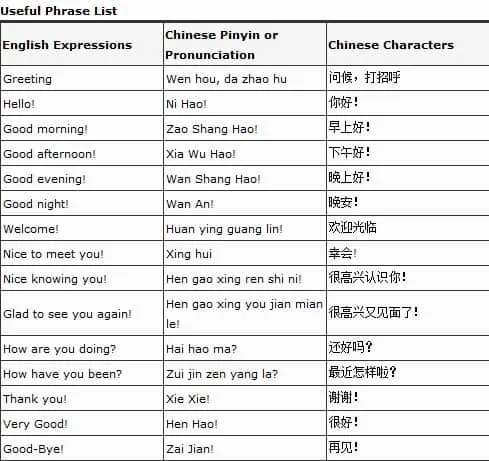Learning Chinese

For the last three decades, English has been a headache for thousands of students who took the university entrance examinations in China. These students are glad to see more and more foreign students are leaning Chinese nowadays, because they know learning Chinese for foreign students is much more difficult than learning English for Chinese students.
Introduction to Chinese Language
 Learning Chinese
Learning Chinese
There are thousands of dialects in China. In last a few decades, mandarin dominates almost in every school in China. More and more parents only talk to their children in mandarin. Thousands of young students even cannot speak the dialects of their own areas. In recent a few years, the governments began to realize that the dialects are the essences of local culture. Some local TV stations began to broadcast several programs in dialects.
Mandarin and Cantonese are the most spoken language for Chinese people.
History of Chinese Language
54 of 56 ethnic groups have their own languages. It is widely believed that the first language system in China was created 6,000 years ago. The oracle bone inscriptions, the earliest characters found in the history of China, were created 3,600 years ago. The official Chinese characters used nowadays were evolved from the oracle bone inscriptions. 22 ethnic groups also have their own characters, which are only used in unofficial communication.
Mandarin
Mandarin, created based on the dialect of Beijing, is the only official language in China. When people are talking about learning Chinese, they mean learning Mandarin.
The modern Mandarin originated in Qing Dynasty, which was founded by Man ethnic group. The Man ethnic group is one of minorities in China. In order to communicate and rule Han people, the ethnic group with the largest population in China, they have to speak Han people’s language. The Beijing dialect is widely accepted by Chinese people at that time, so the Man people changed Beijing dialect a little to make the language easier to learn for people from different areas and promoted the language to all Chinese people.
In 1956, the Mandarin was designated as the only official language of the People’s Republic of China.
Cantonese
Cantonese is not the official language of China, but most oversea Chinese speak Cantonese, because most oversea Chinese are from Guangdong Province, where the Cantonese originated. There are only 4 tones for Mandarin while there are 9 tones for Cantonese. Compared with other dialects in China, Cantonese is more systematic. There are Cantonese Pinyin, characters and textbooks. Songs in Cantonese are very popular in China, even though most people like songs in Cantonese actually do not speak Cantonese. Learning Cantonese is very difficult for both Chinese and foreigners. Foreigners are suggested to learn Mandarin first.
Why to Learn Chinese
There have been thousands of foreign schools which offer Chinese lessons to their students. Why do they do that?
Travel to China
With the development of communication and the economy of China, more and more people realize that there are thousands of tourist attractions in China, such as the Great Wall, Terracotta Army and landscape of Guilin. They want to see the essences of China and a tourist China visa is easy to get, but most Chinese do not speak English now. So foreign tourists are suggested to learn the basic Chinese words, such as 你好(hello),谢谢(thank you) and 这里怎么去?(How to get there?).

Learn Chinese Culture and History
Countless cultures sprang up during the 5,000 years’ history of China. Most cultures have withered due to wars, natural disaster, change of environment or people’s migration, however, the relics of these cultures are still telling fascinating stories about these cultures. In order to understand the stories and cultures completely, foreign people have to learn Chinese.
Quite a few foreigners are addicted to ancient Chinese poems and novels. There are lots of differences between the translated versions and original versions of these masterworks. So these foreigners have to learn Chinese to read the original versions.
Do Business with Chinese People
Due to the large population and territorial area, China is perhaps the most promising business destination in the BRICS. Foreigners are crazily hitting the door of the Chinese market. Language is one of the basic tools to hit the door. In most scenarios, Chinese businessmen are willing to do business with the partners who are more voluble.
Difficulties for Foreigners to Learn Chinese
Learning Chinese is a nightmare for most foreigners. While foreign students are complaining, Chinese people are smiling, because they are happy to see foreigners finally feel the pain of learning a completely different language, just as Chinese learn English.
The Pronunciation Can Not Be Deduced from the Characters
When native English speakers see a new word, they can deduce the pronunciation from the structure of the word, but for Chinese language, the characters have nothing to do with the pronunciation. Students have to refer to a dictionary to find the pronunciation of a new character. For foreign students, it is also difficult to learn how to use a dictionary.
Different Tones, Different Means
There are 4 tones for Chinese Pinyin. The mean of a Pinyin phrase can be different if it is pronounced in different tones. For example, when the phrase ma is pronounced in tone 3, it means horse, while in tone 1, it means MOTHER. Some foreign students even doubt whether Chinese themselves can distinguish these troublesome tones.
Bizarre Strokes
For foreign students who are used to the letters, the strokes of Chinese characters are monsters. When they learn a new character, they have to first remember how many strokes the character has, and then try to PAINT the character with every single stroke. No wonder they often find the number of the strokes of the character they just painted is not the same as the number in their memory.

 Why do Chinese people always talk so loudly?
Why do Chinese people always talk so loudly?  3 Chinese New Year Poems
3 Chinese New Year Poems  Chinese Mid-Autumn Festival Greetings
Chinese Mid-Autumn Festival Greetings  Chinese New Year Greetings
Chinese New Year Greetings